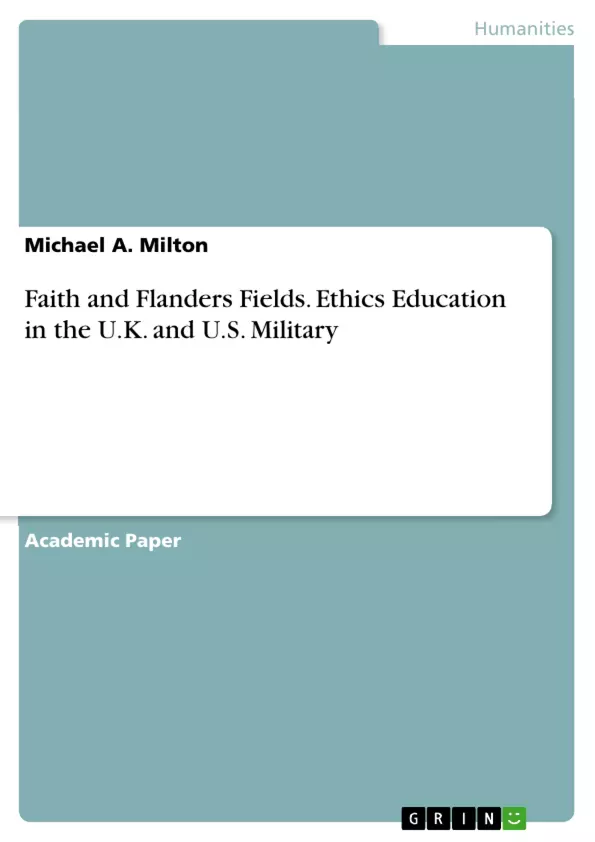What are the lessons learned, from Bataille de la Somme to Seconde Bataille de la Marne, about the ethical training of military service members? The paper considers the catastrophic geo-political discontinuity that the Great War imposed.
Pre-war archival transcription of a report to Parliament by Edward Grey (1905-1916), the British Secretary of State for Foreign Affairs, along with post-war primary sources from Post-War ethicist Max Carl Otto (1876-1968) provide higher historical context for exploring the proposition: The UK, US, Commonwealth, and Western European militaries must return to a transcendent ethical framework for training officers, especially Chaplains.
The rejection of metaphysical ethics (not just religious ethics, but also nontheistic-natural law frames) in exchange for, e.g., a Darwinian ethical construct, resulted in an ethical system that could not answer the Soldier's cry for the meaning of life and solace in suffering. This is a code without a creed. The paper proposes a “mother’s knee ethic,” as a transcendent encouragement that is both accessible to warfighters and serviceable by military educators. Such an ethical charter is already offered in the Army Ethic produced and promulgated by the U.S. Army Center for Profession and Ethics (2014). The paper proposes not only a response to a crisis in ethics education for military members but also offers a pedagogical method in a pluralistic environment, "Cooperation without Compromise."
Inhaltsverzeichnis (Table of Contents)
- Abstract
- The Author
- Introduction
- I. The Transformative War.
- II. Mother's Knee or Civic Ethics: The Question.......
- III. The United States Army has a Transcendent Ethic.
- IV. Moral Man and Immoral Society: Niebuhr's Ethic.......
- V. A Way Forward: Cooperation without Compromise
- Conclusion
- Bibliography
Zielsetzung und Themenschwerpunkte (Objectives and Key Themes)
This paper examines the ethical training of military personnel in the context of the Great War, exploring the need for a transcendent ethical framework to guide their actions and provide solace in the face of suffering. It specifically aims to address the question of what ethical framework is most effective in preparing soldiers for the realities of war.
- The impact of the Great War on ethical frameworks
- The importance of a transcendent ethic in military training
- The role of the "mother's knee ethic" in military education
- The U.S. Army Ethic as a potential framework for transcendent ethical training
- The need for "Cooperation without Compromise" in implementing this ethic
Zusammenfassung der Kapitel (Chapter Summaries)
- The Introduction sets the stage by introducing the topic of the paper and its focus on the ethical training of military personnel. It highlights the transformative impact of the Great War on ethical frameworks and the need for a transcendent ethic to guide soldiers in times of conflict.
- Chapter I, "The Transformative War," delves into the historical context of the Great War, examining the catastrophic geopolitical discontinuity it brought about. It explores the abandonment of metaphysical ethics in favor of more secular frameworks and its impact on ethical thought.
- Chapter II, "Mother's Knee or Civic Ethics: The Question," poses the central question of the paper: what ethical framework is most effective in training military personnel? It introduces the concept of the "mother's knee ethic," suggesting that a transcendent approach to ethics may be more suitable for military education.
- Chapter III, "The United States Army has a Transcendent Ethic," examines the Army Ethic, a document produced by the U.S. Army Center for Profession and Ethics, and explores its potential as a transcendent framework for military training.
- Chapter IV, "Moral Man and Immoral Society: Niebuhr's Ethic," delves into the work of Reinhold Niebuhr, a prominent ethical theologian, and examines his insights on the nature of morality in society. This chapter explores how Niebuhr's ideas can inform the development of a transcendent ethic for military personnel.
- Chapter V, "A Way Forward: Cooperation without Compromise," proposes a pedagogical technique of "Cooperation without Compromise" to deploy the "mother's knee ethic" in military education. It suggests that this approach can effectively incorporate a transcendent ethical framework into military training while respecting the diverse perspectives of military personnel.
Schlüsselwörter (Keywords)
The key concepts and themes explored in this paper include: transcendent ethics, military training, the Great War, "mother's knee ethic," U.S. Army Ethic, Cooperation without Compromise, Reinhold Niebuhr, ethical frameworks, and post-modernity.
Frequently Asked Questions
What is the "mother’s knee ethic" proposed in this paper?
It is a transcendent ethical framework, accessible to soldiers, that provides a moral creed and solace in suffering, beyond mere secular or Darwinian constructs.
How did the Great War change military ethics?
The war led to a rejection of metaphysical ethics in favor of secular systems that the paper argues could not answer the soldier's cry for meaning.
What is meant by "Cooperation without Compromise"?
It is a pedagogical method for a pluralistic environment that allows military educators to implement a transcendent ethic while respecting diverse viewpoints.
Does the U.S. Army already have a transcendent ethic?
The paper suggests that the "Army Ethic" produced by the U.S. Army Center for Profession and Ethics in 2014 serves as such a charter.
Who are the key historical figures mentioned in the study?
The study references Edward Grey, Max Carl Otto, and the ethical theologian Reinhold Niebuhr.
- Quote paper
- Dr. Michael A. Milton (Author), 2018, Faith and Flanders Fields. Ethics Education in the U.K. and U.S. Military, Munich, GRIN Verlag, https://www.grin.com/document/444292



